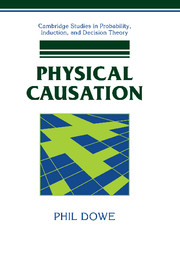Book contents
- Frontmatter
- Contents
- Acknowledgements
- 1 Horses for Courses: Causation and the Task of Philosophy
- 2 Hume's Legacy: Regularity, Counterfactual and Probabilistic Theories of Causation
- 3 Transference Theories of Causation
- 4 Process Theories of Causation
- 5 The Conserved Quantity Theory
- 6 Prevention and Omission
- 7 Connecting Causes and Effects
- 8 The Direction of Causation and Backwards-in-Time Causation
- References
- Index
4 - Process Theories of Causation
Published online by Cambridge University Press: 13 October 2009
- Frontmatter
- Contents
- Acknowledgements
- 1 Horses for Courses: Causation and the Task of Philosophy
- 2 Hume's Legacy: Regularity, Counterfactual and Probabilistic Theories of Causation
- 3 Transference Theories of Causation
- 4 Process Theories of Causation
- 5 The Conserved Quantity Theory
- 6 Prevention and Omission
- 7 Connecting Causes and Effects
- 8 The Direction of Causation and Backwards-in-Time Causation
- References
- Index
Summary
We now turn to another promising line of investigation – the notion of a casual process. We begin with a discussion of Bertrand Russell's notion of a 'casual line,' which, I claim, captures what is lacking in transference theories: immanent casuality. However, it fails to deal with the important distinction found in special relativity between causal and pseudo processes. Thus we turn, in section 4.2, to Wesley Salmon's theory of casual processes and interactions, according to which the causal connections in the world are best analysed in terms of causal processes and interactions, where causal processes are those capable of transmitting 'marks.' The former part of this is defended, the latter part rejected. It is argued (section 4.3) that there are four areas of inadequacy with regard to Salmon's theory: that the theory is circular, that the mark theory is extensionally inadequate, that statistical forks do not serve their intended purpose,and that Salmon does not acheive his stated desire to avoid 'hidden powers.' Nevertheless, Salmon's account is an improvement in important respects on the regularity, probabilistic and transference accounts.
RUSSELL'S CAUSAL LINES
Bertrand Russell is famous for the view, presented in 1913, that the philosophers' concept of 'cause' is otiose in modern science. But later in life, in Human Knowledge (1948:453–460). Russell offers a quite different account. He still regards 'cause,' as used by philosophers, to be otiose but now thinks that advanced science uses causal notions that have been developed from the primitive concept.
- Type
- Chapter
- Information
- Physical Causation , pp. 62 - 88Publisher: Cambridge University PressPrint publication year: 2000



